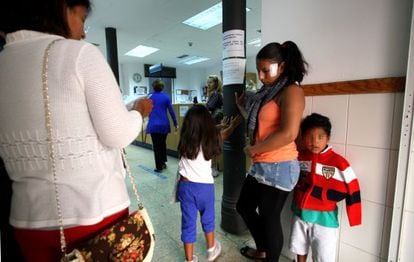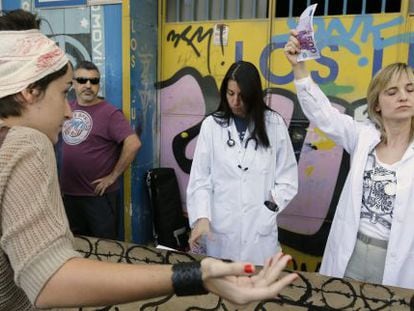Bureaucratic hitch gives immigrants a few days' more healthcare
Process of deactivating cards should be completed "by the end of the week"

Laila Debboun is a 23-year-old Moroccan. She does not have residency papers, has never paid into the Social Security system and does not possess a medical card, but says that she has always been attended to by the public health service. But Monday was different. Debboun was suffering from severe back pain and decided to go to the medical center in Lavapiés, downtown Madrid. What unfolded is an experience that awaits some 150,000 undocumented migrants after the coming into force of a royal decree on September 1 withdrawing their right to free healthcare.
After complaining for some time, Debboun managed to get an appointment. But that was as far as she got. "When I told him my back hurt he said he couldn't prescribe me anything until he had done an x-ray and that it would cost 60 euros, which I don't have."
According to the decree, undocumented immigrants now only have the right to treatment if they are pregnant, minors or in the case of an emergency. The measure has drawn stinging criticism from medical associations and many doctors who have stated their intention to carry on treating irregular patients, citing the Hippocratic Oath. The regional governments, which are charged with applying the decree, responded that they would not prevent medical professionals from doing so, but that they would have to work on their own time.
Due to a bureaucratic hitch the September 1 shutdown did not come into effect because the regional health departments did not receive the pertinent data from the National Institute of Social Security in time to put it into effect. These were sent on the afternoon of September 1 but that was only the first step.
Everybody will be treated; the only thing that will vary is who pays"
"With this data, the regions have to calculate all those whose cards will remain active, and this is more complicated than simply deleting all those that are not," said a Health Ministry spokesman. The glitch has affected those regions that intend to enforce the decree as much as those who have announced they will not: the Basque Country, Asturias, the Canary Islands and Andalusia. All regions controlled by the Popular Party (PP) have backed the measure with the exception of Galicia, which has sided with the non-PP rebels.
María José Sáenz de Buruaga, the vice premier of Cantabria, said the system failure had prevented undocumented migrants' cards from being canceled, but the procedure would be completed "by the end of the week."
"We would never demand that a medical professional deny attention to a patient," Valencia regional deputy premier said in a note to medical centers. "Everybody who requires medical assistance will be treated; the only thing that will vary is the origin of payment."
This is the line that the Health Ministry and the government are toeing: that treatment will not be restricted but who pays for it will change. Illegal immigrants whose governments do not have a bilateral coverage agreement with Spain can sign up for a type of private insurance guaranteeing them healthcare on the public system - 710 euros per year for the under-65s and 1,864 euros a year for seniors.
However, under the terms of the decree, undocumented immigrants will have their medical cards revoked. Without the number on the card it is impossible to make an appointment without the collaboration of a doctor and, more importantly, the public servants manning the appointment system.
Even if an appointment is obtained, the doctor will no longer have the means to send patients for tests or to refer them to a specialist.
Víctor, a 59-year-old Chilean, had a kidney transplant in July. He thought everything was in order until it was announced that his medical card would be rescinded. Last week, he came up against the new regime for the first time. When he went to his local medical center for a check-up, he was turned away.
"I called Médicos del Mundo and they came with me," he says. "The premier of the Balearic Islands, Miguel Reyero, came as well and then they took notice of me."
But last Monday he was due for another appointment. "They called me and said that they had to change the appointment for Friday." The official line was because of the doctor's schedule. But Víctor fears the worst. "I am due for a check-up. We'll see what happens."











































